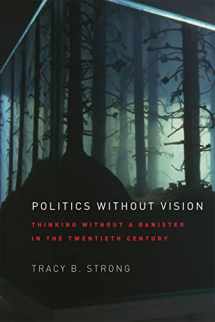
Politics without Vision: Thinking without a Banister in the Twentieth Century
ISBN-13:
9780226777467
ISBN-10:
0226777464
Edition:
Illustrated
Author:
Tracy B. Strong
Publication date:
2012
Publisher:
University of Chicago Press
Format:
Hardcover
406 pages
Category:
Modern
,
Philosophy
,
Political
FREE US shipping
on ALL non-marketplace orders
Marketplace
from $35.00
USD
Marketplace offers
Seller
Condition
Note
Seller
Condition
Used - Very Good
Edition: First Edition; Very Good+/Very Good+ Dust Jacket; Very good+ condition. NOT ex-library. 1st printing of 1st edition. Exterior looks practically new. Binding is tight, sturdy, and square. Unclipped dust jacket also in very good+ condition. An excellent copy Ships same or next business day from Dinkytown in Minneapolis, Minnesota.
Book details
ISBN-13:
9780226777467
ISBN-10:
0226777464
Edition:
Illustrated
Author:
Tracy B. Strong
Publication date:
2012
Publisher:
University of Chicago Press
Format:
Hardcover
406 pages
Category:
Modern
,
Philosophy
,
Political
Summary
Politics without Vision: Thinking without a Banister in the Twentieth Century (ISBN-13: 9780226777467 and ISBN-10: 0226777464), written by authors
Tracy B. Strong, was published by University of Chicago Press in 2012.
With an overall rating of 3.7 stars, it's a notable title among other
Modern
(Philosophy, Political) books. You can easily purchase or rent Politics without Vision: Thinking without a Banister in the Twentieth Century (Hardcover) from BooksRun,
along with many other new and used
Modern
books
and textbooks.
And, if you're looking to sell your copy, our current buyback offer is $1.11.
Description
From Plato through the nineteenth century, the West could draw on comprehensive political visions to guide government and society. Now, for the first time in more than two thousand years, Tracy B. Strong contends, we have lost our foundational supports. In the words of Hannah Arendt, the state of political thought in the twentieth and twenty-first centuries has left us effectively “thinking without a banister.”
Politics without Vision takes up the thought of seven influential thinkers, each of whom attempted to construct a political solution to this problem: Nietzsche, Weber, Freud, Lenin, Schmitt, Heidegger, and Arendt. None of these theorists were liberals nor, excepting possibly Arendt, were they democrats—and some might even be said to have served as handmaidens to totalitarianism. And all to a greater or lesser extent shared the common conviction that the institutions and practices of liberalism are inadequate to the demands and stresses of the present times. In examining their thought, Strong acknowledges the political evil that some of their ideas served to foster but argues that these were not necessarily the only paths their explorations could have taken. By uncovering the turning points in their thought—and the paths not taken—Strong strives to develop a political theory that can avoid, and perhaps help explain, the mistakes of the past while furthering the democratic impulse. Confronting the widespread belief that political thought is on the decline, Strong puts forth a brilliant and provocative counterargument that in fact it has endured—without the benefit of outside support. A compelling rendering of contemporary political theory, Politics without Vision is sure to provoke discussion among scholars in many fields.

We would LOVE it if you could help us and other readers by reviewing the book
Book review

Congratulations! We have received your book review.
{user}
{createdAt}
by {truncated_author}


